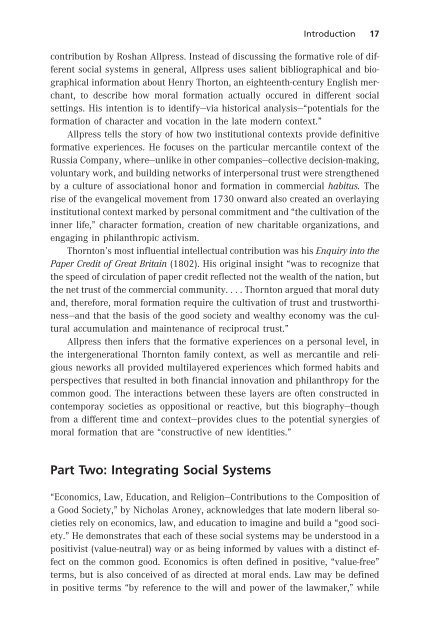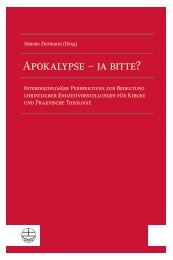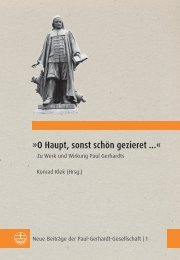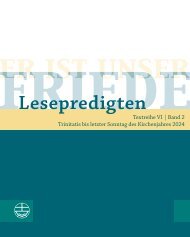Piet Naudé | Michael Welker | John Witte, Jr. (Eds.): The Impact of Political Economy (Leseprobe)
In our late modern pluralistic societies, there are tensions and complementarities between a plurality of individual and social claims and activities to shape societal life and a constructive pluralism of what is known as social systems. The latter provide normative codes and powers emanating from the areas of law, religion, the family, the market, the media, education, academic research, health care, defense and politics. A better understanding and steering of this complex division of powers is crucial for the common good and for freedom and peace. In this volume, a multi-disciplinary team of experts from Germany, Italy, Australia, the UK, the USA, and South Africa bring their conceptual, empirical and historical insights to bear in three broad sections: »The moral dimension of social systems«; »The interaction of religion, law and education with political systems«; and »The moral (mal)-formation evident in case studies on the global financial crisis and social media«.
In our late modern pluralistic societies, there are tensions and complementarities between a plurality of individual and social claims and activities to shape societal life and a constructive pluralism of what is known as social systems. The latter provide normative codes and powers emanating from the areas of law, religion, the family, the market, the media, education, academic research, health care, defense and politics. A better understanding and steering of this complex division of powers is crucial for the common good and for freedom and peace.
In this volume, a multi-disciplinary team of experts from Germany, Italy, Australia, the UK, the USA, and South Africa bring their conceptual, empirical and historical insights to bear in three broad sections: »The moral dimension of social systems«; »The interaction of religion, law and education with political systems«; and »The moral (mal)-formation evident in case studies on the global financial crisis and social media«.
You also want an ePaper? Increase the reach of your titles
YUMPU automatically turns print PDFs into web optimized ePapers that Google loves.
Introduction 17<br />
contribution by Roshan Allpress. Instead <strong>of</strong> discussing the formative role <strong>of</strong> different<br />
social systems in general, Allpress uses salient bibliographical and biographical<br />
information about Henry Thorton, an eighteenth-century English merchant,<br />
to describe how moral formation actually occured in different social<br />
settings. His intention is to identify—via historical analysis—“potentials for the<br />
formation <strong>of</strong> character and vocation in the late modern context.”<br />
Allpress tells the story <strong>of</strong>how two institutional contexts provide definitive<br />
formative experiences. He focuses on the particular mercantile context <strong>of</strong> the<br />
Russia Company, where—unlikeinother companies—collective decision-making,<br />
voluntary work, and building networks <strong>of</strong> interpersonaltrust were strengthened<br />
by aculture <strong>of</strong>associational honor and formation in commercial habitus. <strong>The</strong><br />
rise <strong>of</strong> the evangelical movement from 1730 onward also created an overlaying<br />
institutional context marked by personal commitment and “the cultivation <strong>of</strong> the<br />
inner life,” character formation, creation <strong>of</strong> new charitable organizations, and<br />
engaging in philanthropic activism.<br />
Thornton’smost influentialintellectualcontribution was his Enquiry into the<br />
Paper Credit <strong>of</strong> Great Britain (1802). His original insight “was to recognize that<br />
the speed <strong>of</strong> circulation <strong>of</strong> paper credit reflected not the wealth <strong>of</strong> the nation, but<br />
the net trust <strong>of</strong> the commercial community. ...Thornton argued that moral duty<br />
and, therefore, moral formation require the cultivation <strong>of</strong> trust and trustworthiness—and<br />
that the basis <strong>of</strong> the good society and wealthy economy was the cultural<br />
accumulation and maintenance <strong>of</strong> reciprocal trust.”<br />
Allpress then infers that the formative experiences on apersonal level, in<br />
the intergenerational Thornton family context, as well as mercantile and religious<br />
neworks all provided multilayered experiences which formed habits and<br />
perspectives that resulted in both financial innovation and philanthropy for the<br />
common good. <strong>The</strong> interactions between these layers are <strong>of</strong>ten constructed in<br />
contemporay societies as oppositional or reactive, but this biography—though<br />
from adifferent time and context—provides clues to the potential synergies <strong>of</strong><br />
moral formation that are “constructive <strong>of</strong> new identities.”<br />
Part Two: Integrating Social Systems<br />
“Economics, Law, Education, and Religion—Contributions to the Composition <strong>of</strong><br />
aGood Society,” by Nicholas Aroney, acknowledges that late modern liberal societies<br />
rely on economics, law, and education to imagine and build a “good society.”<br />
He demonstrates that each <strong>of</strong> these social systems may be understood in a<br />
positivist (value-neutral) way or as being informed by values with adistinct effect<br />
on the common good. Economics is <strong>of</strong>ten defined inpositive, “value-free”<br />
terms, but is also conceived <strong>of</strong>asdirected at moral ends. Law may be defined<br />
in positive terms “by reference to the will and power <strong>of</strong> the lawmaker,” while
















